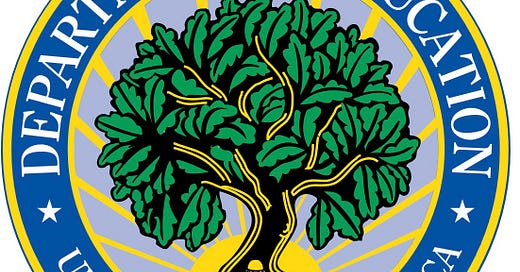In Mandate for Leadership: The Conservative Promise (Project 2025), the first sentence of the chapter on the Department of Education (ED), states that “the federal Department of Education should be eliminated.”[1] If that goal proves to be impossible to achieve quickly, the chapter recommends reverting to prior measures that distributed education programs across various government agencies.
The next Administration will need a plan to redistribute the various congressionally approved federal education programs across the government, eliminate those that are ineffective or duplicative, and then eliminate the unproductive red tape and rules by entrusting states and districts with flexible, formula-driven block grants.[2]
For K-12 education, Lindsey M. Burke, the chapter’s principal author, recommends following Milton Friedman’s 1955 recommendation whereby “education is publicly funded but education decisions are made by families.”[3]
Project 2025’s recommendation for higher education is a little more colorful in reflecting extreme “culture war” annoyance:
Rather than continuing to buttress a higher education establishment captured by woke “diversicrats” and a de facto monopoly enforced by the federal accreditation cartel, federal postsecondary education policy should prepare students for jobs in the dynamic economy, nurture institutional diversity, and expose schools to greater market forces.[4]
Placed in context, these recommendations reflect Republican frustration at being thwarted in repeated attempts to repeal the establishment of ED as a presidential cabinet-level department. Ever since President Jimmy Carter signed the law establishing the Department of Education as the principal coordinator of educational policy at the federal level, Republican administrations and the Heritage Foundation in particular have railed against it. Such positions have characterized previous iterations of Project 2025. This is nothing new for right-wing policy wonks.
I’ll go into greater detail regarding these recommendations in future posts. But for now, I want to call attention to what the ED does.
Currently, the ED manages some 264 programs that support K-12 education and higher education.
Many of these programs provide guidance and extra financial support for students who face special challenges: those with neurodiverse conditions such as autism or other learning impediments, those with physical impairment, and those who suffer racial discrimination or who are economically disadvantaged.
The ED also enforces Title IX regulations concerning sex discrimination and sexual misconduct at secondary and post-secondary institutions. Such protections have recently been extended via regulation to LGBTQI+ students and employees, effective August 1, 2024.
As is widely known, the ED manages major student grant and loan programs, including applications for recipients.
ED also supervises college and university accreditation agencies, including withholding federal funding from institutions that fail to comply with accreditation directives.
Much of the funding for such programs is provided directly to state education departments for distribution to school districts and other institutions. Receiving such funding typically requires adhering to federal laws and policies that prohibit discrimination.
To abolish the ED or to scatter such programs across other agencies (and eliminate many) would create administrative chaos and would harm millions of students at all levels who suffer learning disabilities, physical impediments, racial discrimination, and financial hardship. The result will be restricting higher education opportunities to the few and retarding preparation for careers and fulfilling lives for the many.
For secondary and higher education, Project 2025 is a recipe for disaster.
More to come later.
Please forward your requests for specific topics to me directly or in the comments section of this post. Comments for this post are open to all subscribers.
[1] Paul Dans and Steven Groves, eds., Mandate for Leadership: The Conservative Promise (Washington, DC: The Heritage Foundation, 2023), p. 319. Hereafter cited as “Project 2025.” https://static.project2025.org/2025_MandateForLeadership_FULL.pdf.
[2] Project 2025, p. 321-22.
[3] Project 2025, pp. 319.
[4] Project 2025, p. 320.




